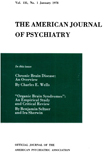AN ORAL SYNDROME COMPLICATING PSYCHOPHARMACOTHERAPY: STUDY II
Abstract
This large-scale investigation over the past year would indicate that we are dealing with a hitherto previously unrecognized syndrome characterized by xerostomia (dry mouth) with or without shrinkage of the gums, diffuse redness of the mucous membranes of the mouth, loosened dentures with or without actual vesicles in the mouth and tongue, denture stomatitis, cracking of lips and corners of the mouth, thin white pseudomembrane formation, white or black hairy tongue, or conversely, the bald beefy red tongue devoid of filiform papillae with varying degrees of atrophy of the fungiform papillae.
In women, an associated moniliasis is present in the vagina in a fair percentage of those tested. Monilia were found in 48% of the oral cultures from patients on phenothiazines or antidepressant drugs (Tofränil and Elavil) alone or in combination, of whom 29.5% had actual clinical lesions.
It is more prevalent in patients who have dentures and is equally common in both hospitalized patients and in private practice. This is not a physiological response to the drug but due to an infection by monilia, specifically, Candida albicans. It responds very satisfactorily in 2 or 3 weeks to treatment by amphotericin B. There is some thought at the present time of developing a solution which hopefully will protect the mouth against this excessive dryness and susceptibility to monilial infection.
Access content
To read the fulltext, please use one of the options below to sign in or purchase access.- Personal login
- Institutional Login
- Sign in via OpenAthens
- Register for access
-
Please login/register if you wish to pair your device and check access availability.
Not a subscriber?
PsychiatryOnline subscription options offer access to the DSM-5 library, books, journals, CME, and patient resources. This all-in-one virtual library provides psychiatrists and mental health professionals with key resources for diagnosis, treatment, research, and professional development.
Need more help? PsychiatryOnline Customer Service may be reached by emailing [email protected] or by calling 800-368-5777 (in the U.S.) or 703-907-7322 (outside the U.S.).



